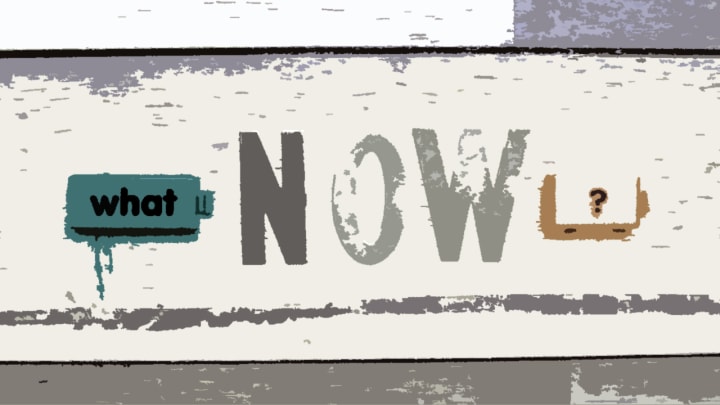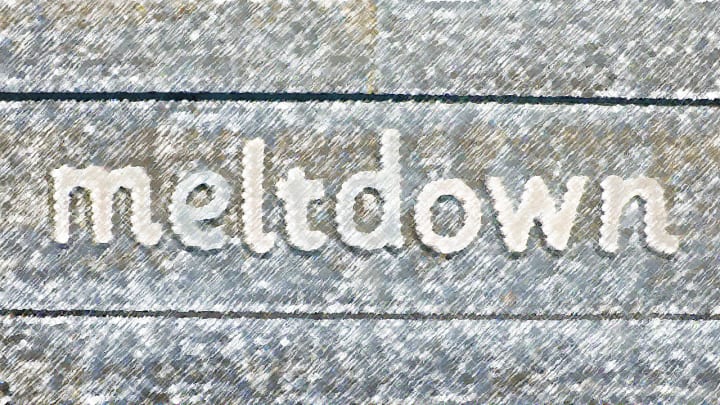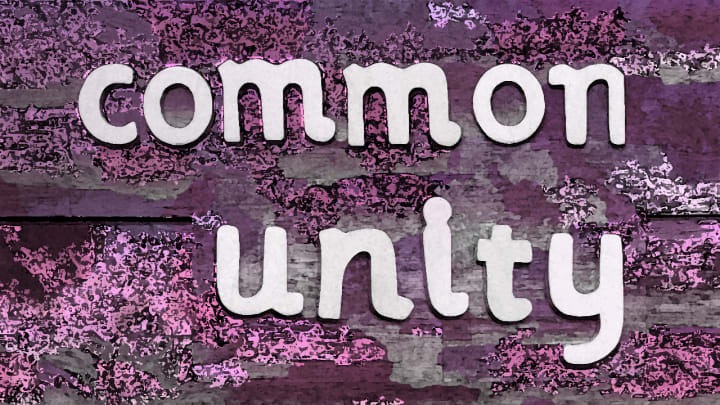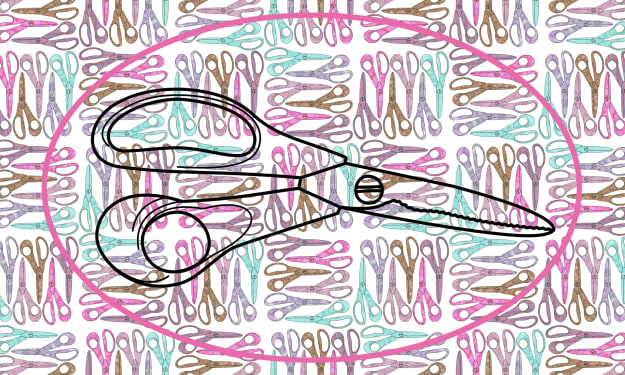On a Knife-Edge
Living a life alongside Autism

No one prepared me for how shockingly hard the last 20 years of my life would be. No one warned me. No one gave me any clue that the journey I was embarking upon would bring me close to breaking point many times over. No one told me how isolated, lonely, desperate, worthless and miserable I would feel at times. No one let on. Not.one.person.
I met my husband in early 2001. Things were good to begin with, and he seemed like a lovely, friendly, chatty type-of-guy. He loved talking at great length about the various round-the-world trips he had taken, his passion for scuba-diving, his beloved cat, motor racing and a few other topics of his interest. At the time, I was happy to listen to everything he said as it bridged a world I had not yet experienced, and I was enthralled by it (as well as being madly in love with him). He treated me well to begin with - wining and dining me, buying me gifts, and taking me places he was interested in showing me. He would also accompany me to places that I requested we go, but looking back I now realise there was always a reluctance present, and never a genuine willingness to accommodate my desires or wishes, but at the time I didn't really notice.
He was happy to socialise with his friends and people he knew, but it was a vastly different matter if I asked him to join me when I was visiting my family or friends. From the outset of our relationship he seemed to be unusually uncomfortable and awkward around “my” people and would often embarrass me in front of them by either saying something highly inappropriate about me, or to me; or behaving in a way that both I and others considered disrespectful, rude or ungentlemanly. I struggled to understand his behaviour at the time finding no obvious reason for it, but no matter how many times I asked him to change his behaviour, it still continued. It often caused me to feel embarrassed, ashamed and confused as I knew this wasn't how people who profess to love each other, behave. I had no answers and no one else seemed able to offer me any logical answers either. People that encountered his behaviour just concluded that he was rude, arrogant and self-centred; a conclusion that it has taken half a lifetime to unpack and decode. For some reason - best known to myself - I chose to continue with the relationship.
Not only did I notice anomalies in his behaviour towards me and others around me, I also started to notice oddities and obsessive behaviour in the way he did particular things.
For example, the curtains in the living room always had to be drawn in exactly the same way every evening – with the left curtain having to sit neatly under the right curtain where they met at the middle of the window.
His packed-lunch consisted (and still to this day consists) of exactly the same items every day:
1. Ham, mature Cheddar cheese and Marmite spread sandwich (with the ham having to always be placed onto the 'Marmited' side of the sandwich)
2. 2 packets of Salt & Vinegar Crisps
3. Can of Coca Cola
The same every.single.day with no variation, and always prepared in exactly the same way (with repeated refusals over the years to include any healthier additions).

His refusal to buy new clothes or shoes, or to try different styles of clothing or footwear also sticks in my mind – it continues to be jeans (or shorts in the summer), loose fitting t-shirts, socks, and trainers. Again, no deviation; although he may add a fleece jumper in the winter if he’s feeling particularly chilly!
Packing things into storage boxes, the car, the shed, the garage, his work van or the kitchen cupboards presents him with an irresistible challenge that he executes with meticulous precision. If anyone tries to offer their help or make suggestions, they are always met with unnecessary insults and criticism, and a million-and-one reasons why his way is better, more logical and more effective – even if it isn’t.
Preparing a meal in the kitchen became a battle of wills (until I got wise to his ways) with him constantly moving around behind me shutting cupboard doors I had just opened, removing empty food containers, packaging or kitchen utensils almost before I had finished with them, and offering his uninvited opinion on how I was doing things – even if it was something that I had done hundreds of times before!
I understand that each of these incidents when encountered in isolation could be overlooked and attributed to someone who is just “set-in-their-ways”, but is only the tip of the iceberg. I also understand that the majority of people have their own preferred way of doing things and will execute tasks in a particular way, but normally with a level of flexibility. Generally, most people are happy to go-with-the-flow as long as the desired outcome is reached in the end. Not so in our situation. For as long as we have been together it has been, and continues to be, his way of doing things, or, his way of doing things. In his opinion, everyone else is flat-out wrong and his way is the only "logical" way to proceed, no matter the situation; and he makes sure that everyone around him knows that his way, thoughts or methods are apparently the best. It makes for a pretty tiresome living situation.

Marriage, and the birth of my first son followed. When my first son was born I hoped that things would start to improve and that my husband would step up and become the father that at the time, I thought he was capable of being. Sadly, I couldn't have been more wrong. Obviously, having just given birth I wasn't going out to work as the teacher I was qualified as, and wasn't therefore bringing any income into our home, but almost from the moment I stopped working - due to being heavily pregnant - our relationship took an alarming turn. The focus of my husband's criticism now became the fact that he thought, in some peculiar way, that he was suddenly more important in our family because he was the only one earning any money. The fact that I was nursing and caring for our newborn son day-and-night seemed to completely escape his notice. He refused to get up and help with the night feeds of our son, and would reluctantly participate in the minimum amount of the general day-to-day care of our son that he could possibly get away with, due to him "having to work". Honestly, it sucked. The verbal abuse intensified and became vicious instead of just bothersome. I vividly remember nights of sitting on our bed sobbing my eyes out until the early hours of the morning, begging him to change, begging him to stop belittling me, devaluing me and criticising me, but all to no avail. His comments were vicious and uncalled for. I was caring - almost single handedly - for our baby son and yet all he was concerned about was the fact that I wasn't earning an income. (I have since realised that one of the things he values most in the world is money, and because I wasn't now contributing to what he valued, he now regarded me as worthless and of no value to him.) But that's all he could see. It was so upside down. But still he blindly continued to justify his comments and continue with his stream of verbal abuse. He just didn't seem able to hear how much he was hurting me by his malicious and ridiculous verbal attacks, and he seemed to take pleasure in asserting his self-assumed authority in our home regardless of who he upset. He just didn't seem to care how he made me feel, and slowly, slowly, trickle-by-trickle, he started to destructively erode my sense of self-worth and identity, not only as a woman and a wife; but more dangerously as a new mama and at one of the most vulnerable times of my life.
And so it continued...

My sleep deprivation continued for many months as I nursed and cared for our fussy little boy who could only be settled after his feeds by endlessly rocking his buggy back and forth for what often seemed like hours. Long nights and the continuing absence of help from my husband started to wear me down. The hostility between my husband and my family (who visited regularly to help me in those first blurry months) also intensified causing me increased stress and dismay in an already hormonally-charged situation. All in all it wasn't good. And all along, I kept hoping and praying and believing that my husband would one day change his ways. I refused to stop believing the best about my husband, and I optimistically continued to believe that maybe one day things would at last be different. Little did I know that not only was he not going to change, but that he was in fact, unable to change, and that what I was dealing with was not just a stubborn, pig-headed, arrogant, egotistical male chauvinistic idiot. Little did I also know that it would take me a further ten painfully long years until I would finally begin to understand my husband's condition.
.
By this time, I was beginning to get desperate. The verbal abuse was slowly starting to break me and I didn't know how to deal with it, or what to do about it. I felt like I was becoming a mere shadow of the bubbly, optimistic, happy soul that I used to be, and I hated how I was beginning to feel. I knew that my now two sons relied on me for everything and that I had to stay strong and balanced for them, but I was rapidly being knocked off balance both emotionally and physically. It was an ugly time. On top of my husband continuing his abuse, my first son started exhibiting some very worrying behaviours which I knew weren't 'normal' for a child of his age. It felt like my world was starting to implode, so being desperate for answers, I started researching. I had to find some explanation for the 'weirdness' going on in our home. Did anyone have any answers? Through doing hours and hours of research online, talking with close friends, reading books and watching videos, I eventually stumbled upon this thing called 'Autism' which alarmingly seemed to explain not only my son's behaviour, but more worryingly, my husband's also. As I learned more about autism it honestly felt like my world fell apart for a second time. Not only is autism a serious neurological condition, it is also a life-long neurological condition with no known cure. I came face-to-face with the earth shattering realisation that the way that my husband and my son were, is likely how they will be for the rest of their lives. My future flashed before me. All hope of things getting better were gone. It was a dark, dark time, and it sent me into a period of grieving.
I grieved for the relationship I knew now I would never have.
I grieved for the love I craved, that I knew would never be there in the way I needed it.
I grieved for my son who would also likely grow up like my husband.
I grieved. I cried. I prayed. And after crying all the tears I had left in me, I started to accept: this was now my life.

In July 2018 we received an official diagnosis of Autism for my son. By this time I had already started to connect-the-autism-dots regarding my husband, and this was also unofficially confirmed by the Psychiatrist who performed my son's assessment. I realised that the issues that I had endured for 17 long years with my husband were due to his undiagnosed condition of autism. At last things started to make sense as I now embarked upon a relentless journey to discover even more about this mysterious condition, and if there was actually any way I could help my autistic husband and son, as well as my non-autistic son who was already starting to suffer both physically and verbally at the hands of my autistic son.
(*Please note - there has been much debate about what a person who is on the Autistic Spectrum should be called. Phrases such as "a person with autism", "an autistic person", "a person on the Autistic Spectrum", or "a neuro-diverse person" all float around the autism sphere, but there is not one definition that is acceptable to all. I generally refer to the members of my family who have autism as my "autistic husband or son" rather than my "neuro-diverse husband or son"; and I generally refer to my son who does not have autism as my "non-autistic" son rather than my "neurotypical son". No offence is meant by any phrase I use. These are just the phrases we use as a family.)
"The word Autism was coined after the Latin word Autismus in 1910 by Swiss psychiatrist Eugen Bleuler; however he applied the word to describing schizophrenia. The Latin word was in turn derived from a Greek word, autos, meaning “self”. Once the condition we now know as autism was discovered in 1938, it was labelled with Bleuler’s word because people who are autistic have been observed to be morbidly self-absorbed to the exclusion of everyone else around them."
(Source https://www.special-learning.com/article/history_of_autism_science

Following my son's diagnosis, I needed to know more, but my journey to find out more has been a long, lonely, and often frustrating venture as my husband continues to deny - even to this day - that there is anything different about him. He believes his "normal" is the same as everyone else's "normal" and that there is obviously something wrong with me instead. He cannot comprehend that he processes things in a totally different way to most people and that his ideas and behaviour are atypical. According to him, all the problems in our marriage are my fault and always have been my fault.
My parents also added to the challenges as they couldn't understand my son's needs for many years either. They certainly knew that something was amiss with my husband, but attributed his behaviour to rudeness, arrogance and selfishness. Regarding my son; when he was out with my parents he would appear to be unusually well behaved and quiet - a behaviour we rarely experienced at home. I now understand that this behaviour was actually due to his severe anxiety of being out in sensory-overloaded social situations which caused him to withdraw and all but shut down until he returned home to his "safe space", where he would erupt at me and explosively release his pent-up anxiety. At the time I didn't understand what he was experiencing or why he was behaving like he was, and it caused me much distress and frustration as I had no one to turn to, no one to ask and no one to support me. It was a desperate time which left me emotionally drained and feeling as though I was failing him as his mum. I also felt like I was failing my non-autistic son, as all I could do was to try and deflect as much of the verbal abuse directed at him from my autistic son as possible, as well as remove him from situations where he became the target of abuse. It felt like a very turbulent, lonely, frustrating season in my life with no one that I could share the experience with, gain wisdom from or confide in.

This brings me to the subject of my membership. Over the last 20 years I have suffered a great deal at the hands of autism. It has nearly broken me as a wife and mother a number of times through my lack of understanding, and the effects of it have torn through our entire family. It is not only a truly mysterious condition, but one that I have come to realise, is also a strangely fascinating one. It is so foreign to the way that I function that it has taken a long time to even begin to understand it.
Our family is split down the middle by autism, and it falls to me to be a support for my autistic husband and son, as well as for my non-autistic son. It is a huge responsibility and one that I frequently wished belonged to someone else, but I have chosen to try and make the best of what we have as a family, drawing on the wealth of experience and knowledge gleaned over the last 20 years. Dealing with autism isn't easy and for us, it isn't going away, but it is from my continued daily experiences of being "in the trenches" that I feel that I can bring something hugely valuable to the world.
There is already a wealth of information available on autism itself, but I have found a severe deficit of support for the people dealing with autism in their families. It is still a hugely misunderstood condition, and is made more challenging because although every autistic person shares similarities in the way they process things and behave, every autistic person also is completely unique, with hugely different triggers, interests and autistic obsessions. IBCCES Board Member and international speaker Dr. Stephen Shore is famously quoted as saying, “If you’ve met one person with autism, you’ve met one person with autism” and I wholeheartedly concur! Nothing could be truer as every single autistic person is different, and each one has unique and individual strengths as well as challenges.
Dr. Shores also goes on to say regarding the quote above:
"This quote emphasizes that there is great diversity within the autism spectrum. While the commonalities of people on the autism spectrum include differences in communication, social interaction, sensory receptivity, and highly focused interests, it’s important to understand that the constellation of these characteristics blends together differently for each individual. This is why some on the spectrum are good at mathematics while others may be good in their arts, sports, or writing – just like the rest of humanity. Autism is an extension of the diversity found in the human gene pool."
(Source: https://ibcces.org/blog/2018/03/23/12748/)
It is from this perspective that I have made it my responsibility to try and understand each member of my family (autistic and non-autistic) for who they uniquely are. My autistic husband has many strengths that are a direct result of his autism such as holding down the same job for over 30 years and having highly skilled wood-working skills. His full-time work, money, and woodworking are some of his autistic obsessions which he is totally focused on, and which he excels at. But ask him to voluntarily spend time with his sons and he is at a total loss...we're working on this one!
My autistic son also has many positive traits that stem from his autism. He is passionate about recycling and rubbish. We own more wheelie bins and rubbish bins than I can count, and his greatest pleasure is going litter-picking with his Grandad around the local area, bringing bags of litter home, tipping them out all over our patio and sorting the rubbish from the recycling and dealing with each accordingly. He is making a significant impact environmentally, and now even has the support of our local borough council for his efforts with them providing him with dedicated rubbish bags which are specially collected by their teams.
Both are wonderfully unique in their own ways.

Autism is certainly not a condition I would have chosen to be involved with, but I am truly passionate about helping as many people as I can who are dealing with autism in their family. Autism can be a destructive condition for the people who have to live with it. The lack of a "verbal filter" in autistic people means that they verbalise the first thing that comes into their mind, whether it's appropriate or not. They have to let others know what they are thinking even if others don't want to know. They have a constant need to control every aspect of their lives, their surroundings, and other people in their lives. It is a very draining condition to live with, as often there is no obvious trigger for an outburst or a meltdown, and it feels like as a family, we are constantly living on a knife-edge.
I know that there are many other neurological conditions that exist and affect families in many varieties of ways, but my experience is with autism and how it can affect families, and that is the focus for my membership. Drawing on a quote I once heard reminds me that if you try to help everyone, you end up helping no one. I cannot be everything to everyone, and for that reason my focus is on helping those people who are dealing with autism in their family member(s). Being a wife and a mum myself who is living alongside a husband and a son with autism, and a son without autism, means my focus will primarily be on supporting other wives and mums in a similar position.
After pondering the events of my life over the last two decades I realise now that there are certain things that would have helped me to get through the last 20 years much more smoothly and less painfully, but weren't readily available then. It is these elements that I will focus on when building my membership.

COMMUNITY: a group of people having a particular characteristic in common; the condition of sharing or having certain attitudes and interests in common. (Source: Oxford Languages)
I would have loved to have had other people to talk to who were dealing with autism in their families; to share with, confide in, strategize with and be encouraged by. No one can change what is going on, but by hearing others' stories and experiences you realise that you are not alone. This was by far the most devastating thing I had to deal with - feeling like I was the only one going through this situation, and that no one else understood. I realise now that there are many others going through similar situations, but I just didn't know how to find them or connect with them. I want my membership to be a place of community, connection and support. I want it to be a place where people know that others understand, and where they can safely share their struggles and be encouraged that they aren't alone.

COMMUNICATION: the imparting or exchanging of information by speaking, writing, or using some other medium; the successful conveying or sharing of ideas and feelings. (Source: Oxford Languages)
I had to search long and hard to find the information I needed on autism. I would love to have had a central 'hub' where I could have found focused, relevant and updated information on the different aspects of autism, including how autism affects autistic people and how autistic people affect those around them. Just being able to find information on the condition of autism itself isn't overly helpful without also finding information on how it affects autistic people in the real world, and how it causes them to behave and react. By understanding more about the condition of autism it helps to support the people with autism, as well as minimise the effects of autism on the non-autistic members of the family. When neurotypical people understand that they have the power to either elevate a potentially explosive situation with an autistic person, or help defuse a situation, it is extremely powerful knowledge. It has taken me a long, long time to understand this concept and apply it to our family. I have discovered that non-autistic people can (generally) modify their behaviour in relation to others around them, whereas an autistic person finds this much more challenging, as they will often say and do the first thing that enters their mind, with seemingly no awareness of the implications. This can lead to extremely volatile situations if not handled appropriately. Knowing that how I react to a situation can either make it or break it, is powerful knowledge. I would like the opportunity to explore this idea further and provide a deeper level of understanding about autism as a condition. I would also like to increase my knowledge of autism through learning from Autism experts, as well as through other peoples' personal experiences of the condition.

CREATIVITY: "creative" - relating to or involving the use of the imagination or original ideas to create something; "creativity" - expressiveness: the quality of effectively conveying a thought or feeling. (Source: Oxford Languages)
One of the only things that has helped me to get through the last 20 years and continues to provide a haven and a sanctuary from the (sometimes crazy) situation I live in, is creativity. My creativity takes many forms including drawing and painting, collage work, mixed-media work, sewing, photography, calligraphy, journaling, card-making and writing. It is an indispensable part of my life and my autism survival mechanism, and will be an important part of my membership so that others can experience the joys of it also. Everyone is creative no matter whether they think they are or not. My aim is to open up creativity in an accessible way that allows everyone who wants to, to partake of it. I will provide a regular, online creative experience for my members to help bring emotional healing, stress relief, and a nourishing, safe space where they can be loved on. Being in a marriage with an autistic person can often feel very lonely and even loveless, and can also result in substantial emotional damage. My desire and hope is that I can provide a creative space for ladies (regardless of their creative ability), to experience creativity, healing, and to help them recover their sense of self belief about who they really are, and not who autism tells them they are.
Life is hard enough generally, but with autism thrown into the mix, it can, and often does become infinitely harder. My goal is to show these precious ladies they are loved and cherished, heard and accepted, and to help them to begin to manage and understand their situations and the people in their lives (both autistic and non-autistic) in ways they never imagined.

M y membership will include:
Monthly Live WEBINARS on Autism
- It will be recorded and will form part of a growing archive of autism resources within the site, which can be accessed by any member for the duration of their membership.
- This is part of the Communication aspect of my membership where information, ideas and feelings will be shared.
- I will interview world-renowned autism experts to learn about the different aspects of autism and how they relate to dealing with autism in real life.
- I will interview people "in the trenches" who are living with autism in their families and who have strategies to share that might help and encourage others.
- I will interview people with autism (who have developed an understanding of their own condition) in order to provide a greater understanding of the condition.
- I will also share my experiences, wins, struggles and strategies regarding how I have learnt to live alongside autism over the last 20 years.
Monthly Live CREATIVE RETREAT Video Calls
- Recorded for members who can't participate live, or for members who want to re-watch the session.
- This is part of the Creativity aspect of my membership to make creativity accessible to all.
- Each month I will provide a new downloadable, printable geometric pattern or hand-drawn image to colour during our creative session, designed by myself. This creative element will be the focus of our session.
- During each call I will bring a short message about identity, as well as speaking affirmations and truths over the ladies about their identity as they colour. I want to provide a nourishing, encouraging space for my ladies to relax, enjoy some creative time and provide a space where they feel loved, appreciated and understood.
Regular Members-Only ARTICLES
- This is also part of the Communication aspect of my membership to share information, ideas and feelings.
- Articles will include research on autism; strategies for living more peacefully alongside autism; articles by autistic people; inspirational quotes; articles on our identity as women, wives and mothers; and anything else that I find inspiring and want to share.
- I will only release one in-depth article a week so that people have the time to read it, understand it and assimilate it, without being overloaded by information.
Members-Only COMMUNITY
- This will be a central part of the site taking the form of a forum or a private group such as a Facebook group or something similar depending on the needs and wants of the group.
- It will be a place for people to share and receive support.
Monthly POSTCARD Gift
- Posted in the mail to any address in the world.
- Each professionally printed postcard will be beautifully designed by me with a truth about identity, such as "You are enough. You are loved. You are strong."
- I personally love encouraging people and letting them know how much I appreciate them, as well as receiving items through the mail. The postcard will be an added bonus of the membership that will bring me immense joy to create and send out, and hopefully bring my members as much pleasure and joy to receive.

About the Creator
Monique Green
Teacher, educator, creative, rainbow unicorn chaser...






Comments
There are no comments for this story
Be the first to respond and start the conversation.